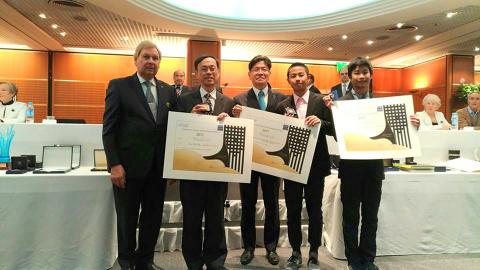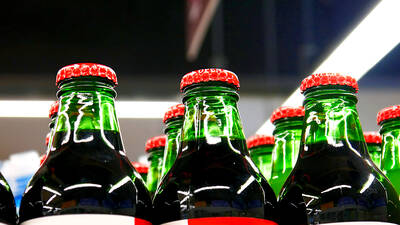Taiwan took 74 medals, including 11 gold, 23 silver and 40 bronze, at the Concours Lepine International that closed on May 6 in Paris. The Concours Lepine International Paris, which has been held since 1901, is one of the world’s most prestigious invention fairs.
Among the country’s medalists were two who were participating for the first time and who also received special mentions from the French organizers. They were Chang Chun-hsiang and Kuo Yu-hsin, both 14-year-old students from Kuai Ji Junior High School in Taoyuan, and were awarded medals for their devices.
Chang’s gold winning device, the “anti-doze alarm detector,” is worn around the user’s neck and makes a warning signal or vibration to keep students or drivers alert when it senses a downward tilt in head movement. According to Chang, the idea was conceived after seeing so many traffic-related accidents in the news due to drunk driving or drivers dozing off behind the wheel.

Photo courtesy of Kuai Ji Junior High School
照片:會稽國中提供
Kuo’s device of an anti-flood alarm detector, for which he won a bronze medal, can be placed anywhere indoors where flooding could potentially take place, and will emit an alarm when the water gets to a certain level. Kuo said his family’s washing machine is on the top floor, and he came up with the idea when the pipe split, causing the apartment to flood.
(CNA, translated by Lin Lee-kai)
台灣發明家今年組團參加巴黎雷平發明展。雷平發明展五月六日舉行頒獎典禮,台灣一共獲得七十四面獎牌,其中包括十一面金牌、二十三面銀牌、四十面銅牌。雷平發明展自一九○一年開始舉辦,是世界上最具聲望的發明展之一。
此外,發明展特別表揚這次參展團內的兩名十四歲國中二年級學生發明人,分別是郭宇新和張鈞翔,他們都來自桃園市會稽國中,都是首次參賽,且發明的裝置都獲獎。
張鈞翔的「打瞌睡警示器」獲得金牌。在脖子上戴上這個裝置,當頭向下傾斜到一定程度,就會發出信號或震動警示。他說,這項發明的靈感來源是因為常常在電視上看到酒駕或打瞌睡造成車禍。
郭宇新的「防洪警鈴」獲得銅牌,是一種居家型警示器,可裝在室內任何可能淹水的地方,當水面到達一定高度,就會發出警訊。郭宇新說,他家的洗衣機放在頂樓,有次水管破裂,造成住家淹水,讓他想出了這個發明。
(中央社)

A: I’m glad that the Grammys will honor the late pop diva Whitney Houston with a Lifetime Achievement Award. Who are this year’s leading nominees? B: Kendrick Lamar is leading the nominations with nine nods, followed by Lady Gaga with seven nods. Bad Bunny, Sabrina Carpenter and Leon Thomas each gained six nods. A: I heard that the song “Golden” from global animated blockbuster KPop Demon Hunters received three nominations, including Song of the Year. B: Blackpink’s Rose and Bruno Mars’ “APT.” also received major recognition with multiple nominations, including Record of the Year, setting a milestone for

It graced statues, colored coffins, and decorated artifacts. It is Egyptian blue, the world’s oldest-known synthetic pigment born in ancient Egypt. Despite its name, it is not limited to a single hue. It ranges from deep blue to greenish tones, often glowing with an almost unearthly brilliance. __1__ In response, the ancient Egyptians developed a synthetic alternative. Not only was it visually striking, but it was also more affordable than imported indigo or natural lapis lazuli. Traces of the pigment have been discovered far beyond Egypt, from wall paintings in Pompeii to tiles in Mesopotamia. However, Egyptian blue began to fall

Contrary to popular belief, glass bottles may pose a greater microplastic risk than plastic ones. A recent study found that beverages stored in glass bottles can contain up to 50 times more microplastic particles than those in plastic containers. Researchers traced most of the contamination to the paint on the outside of the metal caps. The particles found in the drinks matched the cap’s coating in both color and composition. Experts suggest the issue may result from microscopic scratches that form as caps rub against each other during transport or storage. Such scratches can damage the painted coating, leading

Bilingual Story is a fictionalized account. 雙語故事部分內容純屬虛構。 Just yesterday, the boy had helped hang the lucky red couplets. Tonight, as firecrackers signaled the New Year, he lay in bed burning with a surging fever. The herbalist checked the boy’s pulse and went still. “The only cure is in the county town across the mountains,” he said. “But the snow is deep, and the shops are shuttered until the Fourth Day.” The boy’s father looked at the window. “I will go.” “The roads are impassable for a cart,” the herbalist warned. “And too far for a man on foot.” The concerned neighbor